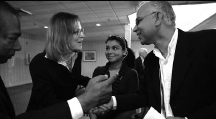Pakistani-Americans and Police Sharing, and Trying to Spread, Trust
By Anne Barnard

At a meeting on Saturday of the Pakistani American
Association of Connecticut, from
left, Zaheer Sharaf,
Kimberly K. Mertz of the FBI and Aleena Raza and
her father,
Syed Raza
Stratford , Conn. — Last month, a resident of Avon, Conn., received a threatening letter full of religious references. The police chief there, Mark Rinaldo, wondered whether the letter implied a broader threat from a Muslim militant.
He called Dr. Atique A. Mirza, a Pakistani-born Muslim cardiologist, who studied the letter for cultural, religious and political clues. They concluded that the threat probably involved a narrow dispute between neighbors.
Now that a Pakistani-American man from Connecticut, Faisal Shahzad, stands accused of trying to detonate a car bomb in Times Square, setting off soul-searching and unease among the state’s thousands of residents of Pakistani descent, Mr. Rinaldo and Dr. Mirza are holding up their relationship — built over three years of meetings and cooperation between Pakistani-Americans and law enforcement — as a model for communities across the state and the nation.
The comfort level is such, said Mr. Rinaldo, that Dr. Mirza “wouldn’t be insulted and say, ‘Why are you calling me,’ “ nor would the chief doubt Dr. Mirza’s analysis. “That’s the trusting relationship we are looking for,” said Dr. Mirza, who has formally assumed the role of Avon’s police-community liaison for the Pakistani American Association of Connecticut (Paact), which has similar representatives in 13 towns and hopes to increase the number to 70.
Paact’s work makes Mr. Shahzad’s case all the more upsetting to Dr. M. Saud Anwar, a pulmonologist who founded the group. He has played a role in the investigation, acting as liaison between the authorities and a Pakistani friend of Mr. Shahzad’s who feared talking to them. The friend provided e-mail messages that may shed light on Mr. Shahzad’s views on violence.
But Dr. Anwar wishes the attempt could have been stopped before it began, something he calls possible in future cases if cooperation between his community and the authorities increases by another “order of magnitude.”
“This is not, God forbid, to spy on people, but just to live your life the way it is and if you notice something that concerns you, speak up,” he said, speaking to about 100 Connecticut residents of Pakistani descent and representatives of the FBI, the State Police and a dozen police departments who gathered Saturday at the Ramada Inn in Stratford. “This is someone who lived among us and under the radar without anybody in the community knowing he was radicalized.”
Paact moves beyond reminding law enforcement not to unfairly paint all Muslims as terrorists — though it still strongly takes that position. It also calls on Pakistani-Americans to acknowledge that people of Pakistani descent have been implicated in high-profile terrorist attacks, to probe the causes and in the process to remind the public that they want security as much as other Americans do.
Dr. Mirza’s wife, Faryal, an endocrinologist, took a similar approach when her son was called “terrorist” in school several years ago. She began giving annual diversity classes, in which she offered Pakistani food and talked about her culture and religion. She also goes out of her way to let patients know she is Pakistani, so they associate the country with something other than terrorism.
Although she could have argued that the burden of explaining culture should not fall on her, she said, “We have to be proactive.”
Now Paact hopes to franchise its approach to other states. On June 19, the group is holding a national conference in Hartford on radicalization and prevention, featuring the Pakistani ambassador, representatives of the National Counterterrorism Center, theologians and others.
Saturday’s meeting focused on the narrower question of how it could have been that people did not seem to remember Mr. Shahzad from a mosque or a dinner party, let alone alert the authorities about him.
Dr. Mirza said it pointed to a need to rethink the atomization of suburban culture: “Know your neighbors; say hi; help them when they need you; be attentive.”
Mr. Shahzad may have isolated himself from mosques and Pakistani organizations, but he must have had some connections; he was married to a Pakistani-American and lived in Bridgeport, where there is a relatively large Pakistani-American population, said Jaleel Rahman, a retired real estate agent.
“We have to be more vigilant,” Mr. Rahman said.
Zaheer Sharaf, Paact’s president, said that many Pakistanis were afraid of the police, because they believe that police officers in their original country are corrupt.
Add to that the post-9/11 fear that reporting a suspicion about a Muslim might lead to an overreaction by the authorities, and it made for a wide gulf between Pakistani-Americans and the police forces that Mr. Rinaldo, the police chief of Avon, said he was unaware of until he began meeting with Dr. Mirza and others.
His reaction: “Wait a minute. We’re the good guys. We have to open up to this community.”
This month, he said, he was upset to see negative reactions to Pakistani-Americans after Mr. Shahzad’s arrest.
“It seems to be one individual, yet a whole community is suffering for the crime,” Mr. Rinaldo said. “It’s not fair.”
Mateen Haider, 56, an engineer from South Windsor, said that Pakistanis, like all immigrants, simply want to fit in, so they are loath to do anything that could draw attention, including call the police.
“That is no longer enough,” he said, telling the meeting: “Today is a great day. We have spoken out. We are all united together as citizens, and we will fight this to the end.” _Courtesy New York Times

